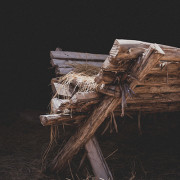Monuments: Lasting memories – Part 4
As an altar reminded Abraham of a death that didn’t happen, so a cross reminds us of how our Savior saved us from eternal death.
Samuel C. Degner
It’s not hard to find memorials that mark the place where someone died. White roadside crosses sit at the spot of a highway fatality. A new tower rises over the place where thousands lost their lives on 9/11. A makeshift memorial of candles, flowers, photos, and teddy bears crops up at the site of the latest tragedy.
But have you ever seen a monument to a death that didn’t happen?
A sacrifice God demands
Abraham was a nomad. He was used to walking for days at a time. But the three-day journey he undertook from Beersheba to Moriah must have felt like the longest of his life. It wasn’t just the distance; he was on a mission to sacrifice his son, his only son. He had God’s promise to bless him—and the whole world—through Isaac; he also had God’s command to kill him. How his confidence and confusion must have struggled with every step!
And what about Isaac? What was behind his question, when he noticed that they had all the materials needed for a sacrifice except the sacrifice itself? What was going through his mind when his father tied him up and placed him on top of the altar?
The Bible answers none of these questions. But perhaps it’s good to ask them because, whether you realize it or not, you were once in Isaac’s place.
You were bound guilty and laid out on the altar of God’s justice. You belonged there for all the times you disobeyed your heavenly Father. His wrath was about to come down on you and end your life eternally.
A substitute God provides
Abraham’s reply to Isaac echoes down through the centuries: “God himself will provide the lamb” (Genesis 22:8).
Who do you think was happier to see that ram caught in the thicket of Moriah—father or son? What a relief to know that another would die in Isaac’s place! Isaac’s hands and feet were untied, and he came down off the altar. He was safe! He would not die at Moriah that day. The stones stacked there were finally stained with blood, but not his. They stood as a monument to one death—and to another that didn’t happen.
Two thousand years later, not far from that very place, God once again provided a Lamb. The innocent Son of God was bound and laid onto a cross-shaped altar. The Father in heaven “did not spare his own Son, but gave him up for us all” (Romans 8:32). The perfect Lamb spilled his innocent blood for our disobedience. The sacrifice is over . . . and we get to live. We’re safe!
Today, we have reminders of that Substitute’s sacrifice all around us—in our sanctuaries, on our steeples, around our necks, on our walls, in the sign the pastor makes at the start of the service, on the stones that mark our final resting place. Each cross is a memorial to the Lamb’s sacrifice in our place. Each cross is a reminder that, because he died for us, we will not die forever but live with him.
Cherish that cross—a monument to a death that happened and to one that never will.
Contributing editor Samuel Degner is pastor at Bethel, Menasha, Wisconsin.
This is the fourth article in a nine-part series on Old Testament monuments and what they mean to us today.
SUBMIT YOUR STORY
Do you have a manuscript, idea, or story from your own life you’d like to share for use in Forward in Christ or on wels.net? Use our online form to share it to our editorial office for consideration.
SUBSCRIBE TO FORWARD IN CHRIST
Get inspirational stories, spiritual help, and synod news from Forward in Christ every month. Print and digital subscriptions are available from Northwestern Publishing House.
Author: Samuel C. Degner
Volume 104, Number 8
Issue: August 2017
Copyrighted by WELS Forward in Christ © 2021
Forward in Christ grants permission for any original article (not a reprint) to be printed for use in a WELS church, school, or organization, provided that it is distributed free and indicate Forward in Christ as the source. Images may not be reproduced except in the context of its article. Contact us




